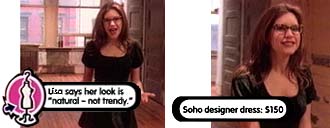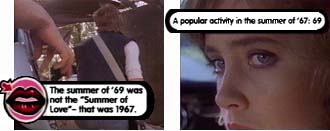Pop-Up Hubris
Television's latest incarnation of the Greek chorus fails to tempt the gods.

Beavis and Butt-Head is a better show now that its makers have quit producing new episodes. The joy of the show was always its minimalism, its almost autistically limited repertoire of cackles, snorts, and monosyllables. In repetition was pleasure, and what made the boys so endlessly expressive was their immunity to sophistication, their staunch refusal to widen their horizons. Unfortunately, as new episodes were added, the boys' vocabulary and range of gestures grew somewhat, with ruinous results. The last thing you wanted to hear from Beavis and Butt-head was a sound, a word, or a sentence you hadn't heard a hundred times before. Novelty isn't always a good thing, and when it comes to choruses in drama--which is what Beavis and Butt-head are (ditto sitcom laugh tracks and the wisecracking silhouettes of Mystery Science Theater 3000)--novelty is a bad, distracting thing.
Since early Greek drama, the role of the chorus has been to give voice to society's narrow-minded, conservative side, not to its open, adventurous side. Sophocles' chorus doesn't egg on Oedipus or reassure him when he takes a risk--it warns him to stay back, to think, to wait. Likewise, Beavis and Butt-head tend to mock whatever is unconventional or "artistic" in the music videos they watch, while eating up the formulaic elements. Choral reactions are reactionary. Heroes who offend or challenge the gods can expect to be mocked by the chorus and, in extreme cases, even to be torn apart.
Now there's a new kind of chorus on television, the "pop-up" music videos of VH1. In case you haven't seen them yet, pop-ups are little white information bubbles that materialize every few seconds during a video with a distinctive oily sucking sound. Sometimes they offer a factoid on the production. Sometimes they draw attention to a flaw. Sometimes they just quip satirically. Music videos, of course, are the perfect target for such harassment; indeed, it's hard now to remember a time when videos were taken seriously. For all the form's alleged daring, for all the pious MTV awards shows devoted to its aesthetic advancement, it never quite transcended its roots in mime. No matter how you cut them, paste them, rotate them, or distort them, lip syncing and air-guitar playing are fundamentally foolish activities, and anyone seen to be engaging in them with anything approaching a straight face is, by definition, taking herself or himself much too seriously.
Television's enormous stockpile of videos now exists chiefly to be debunked and chuckled over by a chorus whose basic message is: See, we told you it would never work! See, we told you it looked pretentious! And just as pundits now seem more important than the politicians they talk about (politicians keep resigning to become pundits), these debunkers are the new stars of music television, supplanting the video directors and the bands. Pop-Up Video is the highest-rated show on VH1. The people behind the program, a former cultural-studies graduate student from Yale and his company, Spin the Bottle Productions, have big plans to adapt their gimmick to forms other than videos. There are to be pop-up countdowns, pop-up interview shows, pop-up game shows. Other network and cable programs are getting in on the act. An episode of the ABC sitcom Sabrina the Teenage Witch has been Pop-up-ized (though not by Spin the Bottle). ESPN used the form to provide instant commentary on its "Play of the Week." Even Beavis and Butt-Head used pop-up-like captions on a special titled "The World's Most Expensive Video." The possibilities seem limitless.

T hey aren't, though. Pop-up represents the dead end of a trend, not its vibrant beginnings.
Consider the pop-up version of Lisa Loeb's video for "Stay." The video shows a SoHoish young Loeb, all long, straight hair and dark clothes and chunky glasses, standing in an empty loft. Via pop-ups, we learn the director is Ethan Hawke, which is good for a laugh in itself. Actors should not try to be directors, the chorus is saying, and woe to those who try. The pop-ups go on to point out the video's awkwardness and the pathetic smugness of Loeb's performance. One bubble quotes her as saying that her look is "natural--not trendy," and the next lets us know that the dress she's wearing cost $150, which, supposedly, is a lot. Pop singers, the chorus is saying, should not try to pass themselves off as regular people. When a subsequent bubble informs us that Loeb's album failed to sell as well as had been expected, that's the chorus saying: Served her right. Pride goeth before a fall in the charts.

P op-ups are droll and absorbing, at least at first. The problem with them is that after a while they direct so much attention to themselves--and to the cleverness of their creators--that it's them, the pop-ups, that seem arrogant, not the videos. In one Bryan Adams video there's a line about the"summer of '69." A bubble appears and reminds us that "69ing" is slang for mutual oral sex. Another bubble reminds us that '67 was known as the Summer of Love. Finally, the punch-line bubble arrives: "A popular activity in the summer of '67: 69." Besides being strained and a little lame--though not strained and lame enough to be self-parody--this witticism screws up everything by reversing the proper relation of chorus to hero. It's like someone stepping out of the circle surrounding Oedipus and showing the audience a magic trick.
Too often, pop-ups say lookatme instead of look at that. It's the form's fatal flaw: the desire to be appreciated. The one thing a chorus can't do and still stay a chorus is stand taller and prouder than the subject of its digs and admonitions. It makes the subject look persecuted and the chorus like a bully. Watch too many pop-ups, and you start wishing that Lisa Loeb or Bryan Adams would put the mike down, reach out into space, and puncture one of the pop-ups with a pin.